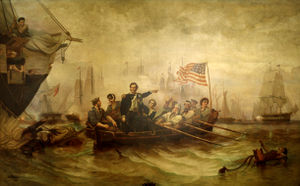
Blogging Domains For Sale
Bidding opens at: $25
Doughmain: http://www.Warof1812Blog.com
The War of 1812 was fought between the United States and British Empire from 1812 to 1815, on land in North America and at sea around the world. Some history books refer to this war as the "War of 1812-14", using the date of the peace treaty as the ending date of the war.
The war formally began on June 18, 1812 with the U.S. declaration of war. The United States launched invasions of Britain's North American colonies in 1812 and 1813, but the borders were successfully defended by British and North American Indian forces. The United States gained the upper hand in the North American Indian part of war with victories at the Battle of the Thames in October 1813 and the Battle of Horseshoe Bend in March 1814, but, by this time, the United Kingdom had successfully concluded the Napoleonic wars and the British were finally able to divert more resources to North America. British invasions of American territory resulted in the burning of Washington, D.C. and the capture of part of the District of Maine, but the British counteroffensive was turned back at Lake Champlain, Baltimore, and New Orleans. The Treaty of Ghent (ratified in 1815) restored the status quo ante bellum between the combatants.
The War of 1812 ended as a stalemate and it is often only dimly remembered in Britain. It had many effects on the futures of those involved. The war created a greater sense of nationalism in both British North America and the United States. The successful defense of the British colonies against American invasion ultimately ensured the emergence of Canada as a nation, and the end of the war marked the decline of a longstanding desire of many Americans to see the British Empire expelled entirely from North America. Peace between the United States and British North America also meant that North American Indians could no longer use conflicts between the two powers to defend native lands against the expansion of white settlement.
On the Great Lakes border, more than half of the British forces were made up of Canadian militia. Additionally, many North American Indian peoples (today most often called "Native Americans" in the United States and "First Nations" in Canada) had their own reasons for fighting alongside either the British or the Americans. In the Northwest Territory, the War was, in a sense, a continuation of Tecumseh's War after his defeat in the Battle of Tippecanoe in 1811.
Bidding will ensue in auction-fashion and will remain open until buyer & seller agree on a final price. Should you wish to make a "Buy Now" bid, please indicate in your email that your price is final.
Please email all bids/inquires to: blogdomains@gmail.com

No comments:
Post a Comment